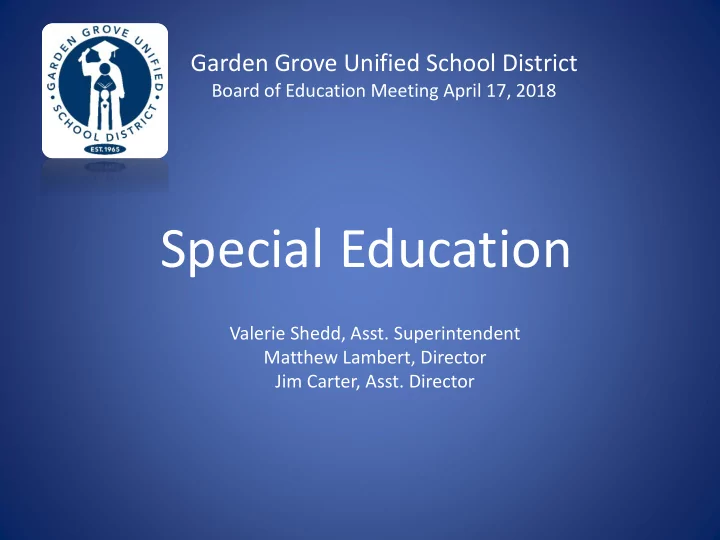

Garden Grove Unified School District Board of Education Meeting April 17, 2018 Special Education Valerie Shedd, Asst. Superintendent Matthew Lambert, Director Jim Carter, Asst. Director
The Garden Grove Way
Why Special Education? • Individuals with Disabilities Education Act (IDEA) – Originally enacted in 1975 and revised over the years – Federal law ensuring all individuals with disabilities have the right to a public education – Schools must find and evaluate students suspected of having disabilities Purpose of IDEA Provide a Free Appropriate Public Education (FAPE), in the Least Restrictive Environment (LRE)
Least Restrictive Environment (LRE) • Educate students with disabilities with their non- disabled peers, to the greatest extent possible • Consider: curriculum, environment, accommodations, amount of support • Instruct students in an environment to best access and benefit from their educational program
Initial Identification Pre-K • Preschool Assessment Center (PAC) – Site-based comprehensive assessment team – Regional Center of Orange County (RCOC) referrals must be held by 3 rd birthday – Parent Requests for 3 to 5 year olds 7% Students identified before Kindergarten
Initial Identification TK-12 • Identification Process – Teacher identifies student is struggling – In-class interventions implemented – Student Study/Success Team (SST) • Additional interventions and support – Referral to School Psychologist 93% Students identified after starting kindergarten
Assessment for Special Education • Case Manager completes assessment – Student is assessed by trained personnel in all areas of suspected disability – IEP is held within legal timelines (60 days) – Not all students qualify • Legal measures for how students qualify • Struggling academically does not automatically qualify
Eligibility for Special Education • The 13 Eligibility Categories – Most disability definitions include an “adverse effect” on “educational performance” 1. Autism 2. Deaf-Blindness 3. Deafness 4. Emotional Disturbance 5. Hearing Impairment 6. Intellectual Disability 7. Multiple Disabilities 8. Orthopedic Impairment 9. Other Health Impairment 10. Specific Learning Disability 11. Speech or Language Impairment 12. Traumatic Brain Injury 13. Visual Impairment, including Blindness
Initial Individualized Education Program (IEP) Meeting • Student eligibility is determined • Present levels of performance are discussed • Areas of unique need are identified • Goals drive team decision-making around the necessary services for the student to access and benefit from their instructional program
Program Placement • Based on the assessment and IEP team input, placement can be determined General Related Mild- Moderate- Resource Education Services Moderate Severe
Individualized Education Program (IEP) Meetings • Initial • Annuals • Triennials • Transitions • Special Review (as needed)
District Programs Continuum of Services from age 3 to 22 Serving 5,438 students
Special Education Enrollment by Primary Disabling Condition (CASEMIS, 2017) 2,500 2,171 2,000 Total Number of Students 1,500 1,250 1,000 826 583 500 278 0 Specific Speech & Autism Other Health Intellectual Learning Language Impairment Disability Disability Impairment
Special Education Enrollment by Primary Disabling Condition (CASEMIS, 2017) 90 85 82 77 80 70 Total Number of Students 60 54 50 40 30 20 20 7 10 3 2 0 Hard of Emotional Multiple Orthopedic Visual Traumatic Deaf Deaf-Blind Hearing Disturbance Disabilities Impairment Impairment Brain Injury
Support for Our Students • Continuum of services from age 3 to 22 – Preschool services from age 3-5 – Access to Specialized Academic Instruction – Related Services • (Speech; Adapted Physical Education; Occupational Therapy; Physical Therapy; Educationally-Related Mental Health Services) – Adult Transition Program (ATP) • post secondary up to age 22 – Special Education Center (SEC) at Mark Twain - medically fragile and students with profound intellectual disability
Continuum of Services • General Education • with Academic or Behavioral support • Speech-only support • Resource (RS) • Push in/Pull out (K-6) • Flexible grouping • Inclusion (7-12) • Mild/Moderate (MM) • Range of being included or in more supportive classrooms • Moderate/Severe (MS) • Greater support • Academic and functional skills
Adult Transition Program (ATP) • Transition supports to focus on independence and post-secondary success • Working on foundational life skills to positively engage their environment and community
Special Education Center (SEC) at Mark Twain • Serving medically fragile and students with profound intellectual disabilities • Ages 5-22
Continual Improvement of Services • Pre-school at Early Childhood Education Center at Carver and Heritage • K-6 Changes over time to support Least Restrictive Environment (LRE) – MM students clustered at specific K-6 sites, as of next year they will be in blended programs at their home school – We had many successes and learned many lessons during 1 st rollout – Professional Development for General and Special Education teachers
Continual Improvement of Services • 7-12 differentiating for each student through course scheduling – Increasing our number of students meeting A-G • Adult with Disabilities Program at Lincoln Ed. Center – funded by Regional Center – Continue to build our partnership
Parents as Partners Community Advisory Committee (CAC) • Comprised of parents, district personnel, community members • Enhance the quality of the special education programs and services • Select topics for parent presentations • Host an annual district-wide Special Education Award Ceremony
Office of Special Education • District Administrators – Asst. Superintendent – Director – Asst. Director – Program Supervisors (14)
Office of Special Education • Speech and Language Pathologists (62) • School Psychologists (39) – Added 16 in last 5 years • Nurses (21) • Adapted PE Teachers (9)
Instructional Team • Special Education Teachers – – Teachers (270) – Teachers on Special Assignment (6) • Aides – Instructional Aides (514) – Intensive Behavioral Intervention Aides (185)
Special Events • Adapted Physical Education (APE) Special Games – Track and Field – Basketball Tournament • Roadmap to Success • Strawberry Festival • Bell Intermediate Thanksgiving Feast
Special Games Adapted PE Teachers partner with Special Olympics Special Games 2017 Video
Recommend
More recommend